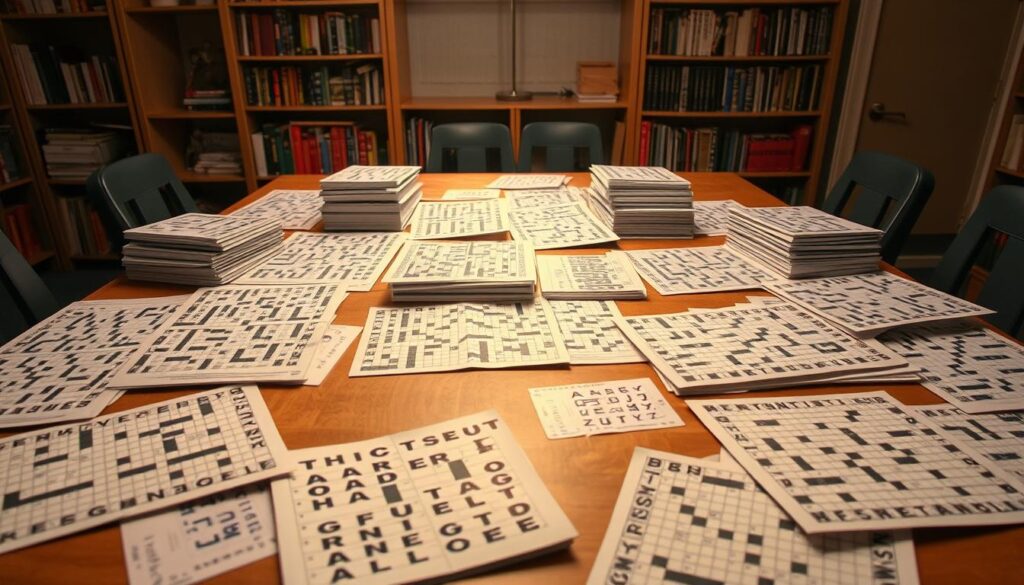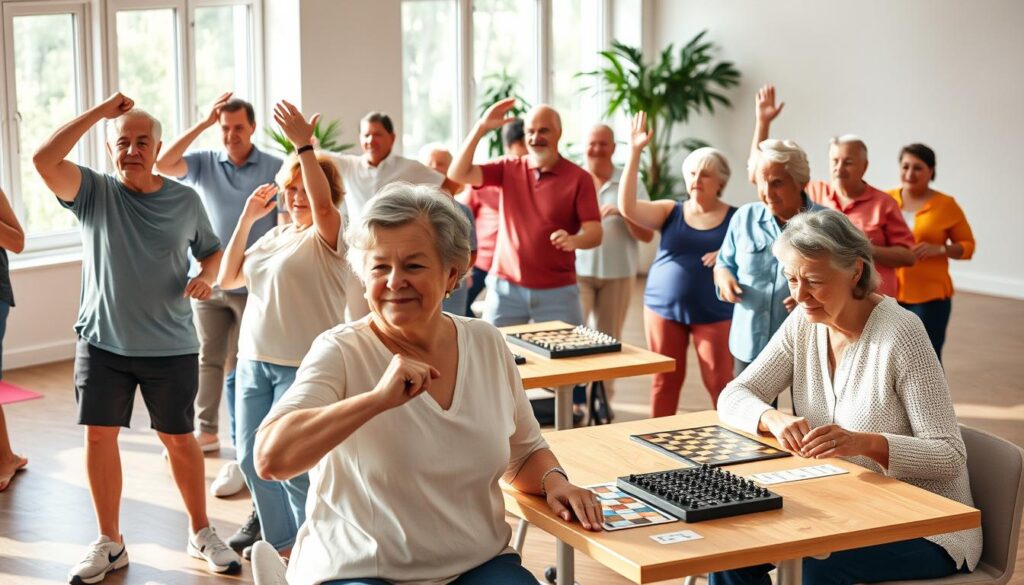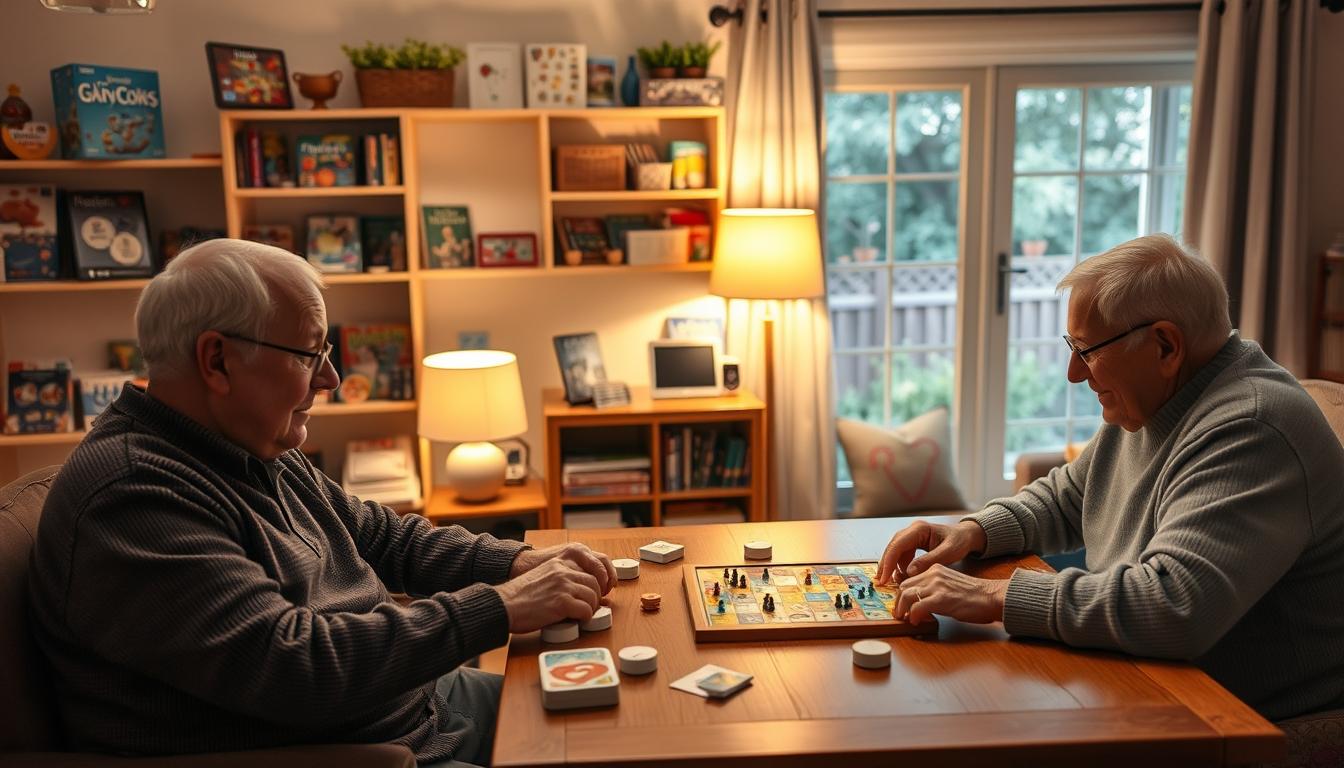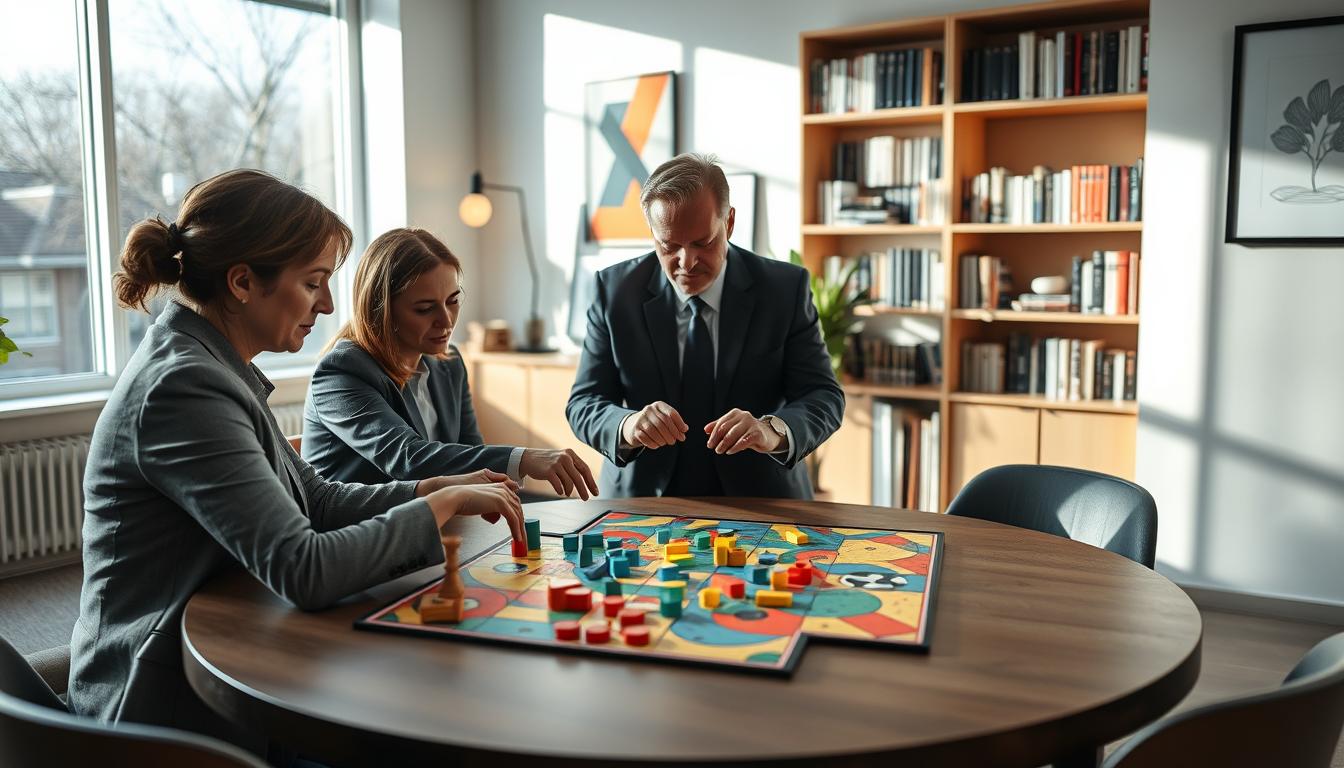Cognitive educational games for adults and seniors with early dementia
What if the secret to keeping seniors’ brains healthy with early dementia isn’t medicine? Instead, it might be in playing cognitive games. These games are made for adults and seniors with early dementia. They help keep minds sharp, improve memory, and might even slow down brain decline.
By playing these games, seniors can take charge of their dementia. It’s a way to stay mentally sharp and feel better overall.
Introduction to Cognitive Games
Cognitive games are a fun way to boost mental skills. They are key in helping with dementia care. These games help improve memory, attention, and problem-solving skills.
They are designed to be enjoyable for seniors. This makes mental exercises a pleasure, not a task.
Playing brain games can greatly help seniors. It boosts their mental abilities and makes them feel accomplished. These games also help family members bond, creating stronger relationships.
They encourage socializing, which is vital for emotional health in early dementia. This interaction makes life more enjoyable for everyone involved.
Cognitive games are essential for keeping the mind sharp. By adding them to daily routines, seniors can live better lives.
| Cognitive Game Types | Key Benefits |
|---|---|
| Memory games | Enhance recall and recognition abilities |
| Puzzle-solving games | Improve critical thinking and problem-solving skills |
| Strategy board games | Encourage planning and decision-making |
| Online brain training exercises | Offer diverse challenges with measurable progress |
Understanding Early Dementia and Cognitive Decline
Early dementia is a stage where people start to show signs of mild cognitive impairment. They might notice they’re forgetting things more often. They could find it harder to plan tasks and might feel mood swings.
It’s important to recognize these symptoms early. This way, we can start looking into treatments and making lifestyle changes sooner.
Keeping seniors mentally active is key. Research shows that activities that challenge the mind can slow down dementia’s progress. This helps them live better lives.
Starting early interventions and making lifestyle changes can greatly improve cognitive health. It’s important to keep the mind active, stay socially connected, and regularly check on cognitive health. These steps can help manage memory loss and other dementia-related issues.
The Importance of Mental Stimulation for Seniors
Mental stimulation is key for keeping the mind sharp in seniors. As people get older, keeping their minds active can slow down mental decline. Studies show that regular brain challenges help keep the mind healthy and focused.
Games and puzzles are great for mental stimulation. They not only test the brain but also help seniors feel connected. This can reduce loneliness and improve overall well-being.
Creating routines that challenge the mind is important. Even simple tasks can become fun and keep the mind sharp. This leads to a more active and fulfilling life for seniors.
Cognitive Games for Seniors with Early Dementia
Cognitive games are great for seniors with early dementia. They can make mood better, improve thinking, and boost emotional health. The right games can make the brain work harder, help remember things, and bring people together.
Benefits of Engaging in Cognitive Games
Playing cognitive games has many benefits for seniors with dementia. These games can:
- Enhance cognitive function through repeated mental exercise.
- Improve mood by providing enjoyable, engaging activities.
- Encourage social interaction, creating a sense of community and belonging.
Types of Cognitive Games to Consider
There are many cognitive games that are good for seniors with early dementia. These include:
- Crossword puzzles: These help to boost vocabulary and recall abilities.
- Number games: Activities like Sudoku can enhance reasoning and problem-solving skills.
- Card games: Playing games such as bridge or poker promotes strategic thinking and interaction.
Computerized Brain Training Games
Computerized brain training games are becoming more popular for seniors. They help improve memory, speed, and decision-making skills. These games offer personalized exercises to tackle specific challenges.
Playing these games can be fun and help keep the mind sharp. It’s key to mix up the games to keep the brain active. This way, it stays ready to learn new things.
Studies on brain training are ongoing, but many people feel more alert after playing. It’s important to watch how much time is spent on screens. Too much can harm eyes and sleep. A mix of digital games, physical activities, and socializing is best for mental health.
Crossword Puzzles as a Tool for Memory Stimulation
Crossword puzzles are now seen as a great way to keep the mind sharp, especially for older adults. Studies show they are not just fun but also help improve thinking skills. Doing crossword puzzles regularly can make your mind more agile and help you remember things better.

How Crossword Puzzles Enhance Cognitive Function
Doing crossword puzzles is a fun way to exercise your brain. Here are some benefits:
- Memory Enhancement: Solving puzzles helps strengthen your memory by recalling information.
- Vocabulary Expansion: They introduce new words and ideas, boosting your language skills.
- Problem-Solving Skills: Puzzles improve your critical thinking and logical reasoning.
- Social Interaction: Working on puzzles with others can help you make new friends and feel connected.
By doing crossword puzzles often, you can slow down memory loss. They are a great way to keep your mind sharp as you get older.
Number Puzzles for Improving Reasoning Skills
Number puzzles are known for boosting reasoning skills and cognitive benefits. Activities like Sudoku are fun and help improve mental abilities. For seniors with early dementia, solving number puzzles daily can greatly enhance their thinking.
Benefits of Sudoku and Other Number Games
Research shows that solving number puzzles regularly improves reasoning skills. Programs that include Sudoku and other games offer many benefits:
- Improved Attention: Number games sharpen focus, helping people stay focused on tasks.
- Enhanced Memory: These puzzles improve memory, making it easier to recall information.
- Boosted Reasoning Capabilities: Solving puzzles strengthens the brain, enhancing decision-making skills.
For those with mild cognitive impairment, these activities build cognitive resilience. Regularly solving number puzzles is not only fun but also keeps the mind healthy.
The Role of Three-Dimensional (3D) Video Games
Three-dimensional (3D) video games are a new way to boost cognitive health in older adults. These games require players to explore different spaces and solve complex puzzles. Playing 3D games can greatly improve memory and brain function.
Studies show that seniors who play 3D games get better at remembering things and understanding space. These games are fun and also good for the brain. They mix fun with learning, making them a great choice for mental exercise.
Playing 3D games lets players dive into virtual worlds, having fun while exercising their brains. This type of game offers challenges that help improve thinking and solving problems. So, 3D video games are a great way to keep the mind sharp and have fun exploring new places.
Social Games and Their Impact on Engagement
Social games are key for seniors, especially those with early dementia. They offer fun and help keep the mind sharp. Card games, like Uno and Go Fish, are great for this. They make playing together a fun, friendly competition.
Games like Uno and Go Fish are easy for seniors to play. They’re simple, so everyone can enjoy without getting stressed. Playing these games helps keep families close and makes everyone happy.
Examples of Fun Card Games for Seniors
- Uno: A classic card game that encourages color matching and strategic thinking, perfect for group play.
- Go Fish: This simple game aids memory retention as players ask each other for specific cards.
- Old Maid: A light-hearted game that focuses on memory and basic strategy, ideal for family gatherings.
- Rummy: A classic that stimulates social interaction while enhancing cognitive skills through pattern recognition.
Incorporating Creativity Through Crafts and Activities
Engaging in creative activities is key for seniors, especially those with early dementia. Crafts like painting, scrapbooking, and DIY projects are great. They help with memory and mood, and offer a chance to express oneself.
These activities let seniors share stories and connect with others. It’s a way to reminisce and feel closer to family and friends.
Simple Crafts that Stimulate Cognitive Engagement
There are many crafts that fit seniors’ interests and abilities. This makes them fun and inclusive. Here are some examples:
- Scrapbooking: It lets seniors share memories and work on their storytelling.
- Painting: Using watercolors or acrylics boosts creativity and fine motor skills.
- Knitting or Crocheting: These crafts improve hand-eye coordination and are calming.
- Card Making: It’s a creative way to connect with loved ones.
- Flower Arranging: It stimulates creativity and offers sensory benefits.
These crafts not only entertain but also help keep seniors’ minds sharp. They improve overall well-being.
The Value of Outdoor Activities for Mental Health
Outdoor activities are key for mental health, especially for seniors with early dementia. Activities like walking, gardening, or birdwatching boost physical health and connect us with nature. Being outside also lifts our mood and gives a break from indoor spaces.
Nature is great at reducing anxiety and agitation in dementia patients. Research shows that being in nature improves overall well-being. This makes outdoor activities crucial for dementia care. They help keep the mind active while enjoying the outdoors.
Tasks like gardening or feeding birds offer physical and mental benefits. They spark creativity, encourage mindfulness, and can build social bonds. By focusing on outdoor activities, caregivers help improve mental health and enrich lives of those with early dementia.
Combining Physical Exercise with Cognitive Games
Mixing physical exercise with cognitive games boosts brain health. Activities like chair yoga or light weight lifting, paired with brain games, offer a full mental workout. Studies show that exercise improves mood and brain function. This combo is great for seniors with early dementia.
Adding physical and mental activities to your routine has many benefits:
- It sharpens mental focus and clarity
- It boosts mood by releasing endorphins
- It encourages social interaction in group settings
- It tackles cognitive challenges from different angles
By doing a variety of activities, seniors can slow down cognitive decline and feel better. Encouraging seniors to exercise and play brain games leads to a richer life. It focuses on both physical and mental health.

Creating a Routine that Balances Different Types of Games
Creating a game routine is key for seniors with early dementia. It should include brain training games, social activities, and creative or physical ones. This mix keeps seniors engaged and boosts their cognitive strength.
Adding structured activities to daily life is essential for dementia care. Set aside specific days for different games. This way, each session matches the person’s interests and abilities. It helps caregivers see progress and make needed changes.
A balanced game routine makes life better for seniors. It keeps their minds active and helps slow down cognitive decline. Caregivers play a big role in making this happen, leading to a fulfilling life for those with early dementia.
Monitoring Progress and Adjusting Activities
Keeping track of progress is crucial for those with early dementia to get the most from cognitive games. Regular checks help caregivers see how people react to different activities. This way, they can make changes as needed.
Adjusting activities is important. It’s about knowing what each person likes and can do. This makes games more fun and challenging, without getting too hard.
Being flexible is key for caregivers. They need to change activities as needed. This keeps games interesting and helps people stay engaged.
Conclusion
Cognitive games are key for keeping seniors with dementia’s brains sharp. They offer a way to keep minds active and foster connections between seniors and caregivers. By trying different games, families can help their loved ones stay mentally sharp and socially involved.
Creating a routine with games that seniors enjoy can really help their thinking skills. It’s important to watch how they do and change games as needed. This way, seniors get both mental and emotional support, which is crucial when facing dementia.
Adding cognitive games to daily life helps seniors feel more in control and purposeful. By focusing on brain health through fun activities, families can make every moment special. It turns challenges into chances for happiness and connection.
FAQ
What are cognitive educational games for seniors experiencing early dementia?
Cognitive educational games are activities made for adults and seniors with early dementia. They aim to boost memory, attention, and problem-solving skills. This helps keep their minds sharp and slows down mental decline.
Why is mental stimulation important for seniors?
Mental stimulation is key for seniors as it keeps their minds sharp. It helps slow down mental decline and boosts mood. Activities that challenge the brain can improve quality of life and delay dementia symptoms.
What types of cognitive games are beneficial for early dementia?
Good games for early dementia include crossword puzzles, Sudoku, and number games. Strategy games and social card games are also great. They improve memory, thinking skills, and offer chances for social interaction, boosting emotional health.
How do computerized brain training games help seniors?
Computerized brain training games offer exercises for memory, speed, and thinking. They provide fun, interactive ways to keep the brain active. This can help seniors with dementia stay mentally engaged.
Can outdoor activities benefit seniors with early dementia?
Yes, outdoor activities can improve mood and thinking in seniors. Activities like gardening, walking, and bird watching are great. They offer physical and mental benefits, boosting mental health.
What role do social games play in cognitive health?
Social games, like card games, are fun and good for the mind. They encourage seniors to interact with others. This strengthens emotional bonds and fosters a sense of community.
How can creativity through crafts impact cognitive engagement?
Creative crafts like scrapbooking, painting, and DIY projects are great for the mind. They stimulate mental functions and allow for self-expression. These activities also spark conversations and improve mood.
How can physical exercise be combined with cognitive activities?
Mixing physical exercise with mental activities, like chair yoga or light lifting, is beneficial. Studies show it can improve thinking and mood. This holistic approach is good for seniors with early dementia.
How can caregivers monitor the effectiveness of cognitive games?
Caregivers should watch how well the games work by seeing how the person responds. Changing activities based on their preferences and responses can make them more enjoyable and effective.














